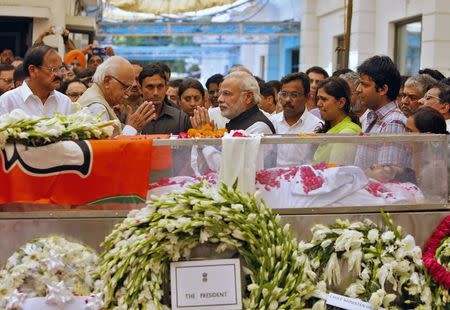Indian minister killed in road collision, blow for Modi
By Sanjeev Miglani NEW DELHI (Reuters) - India's minister for rural development died on Tuesday after a road collision in New Delhi, depriving Prime Minister Narendra Modi of a key ally eight days after coming to office with a mandate to revitalise a stalled economy. India's roads are among the most dangerous in the world, and the capital, New Delhi, ranks near the top of cities that account for the most fatalities. Gopinath Munde, 64, was on his way to the airport for a victory rally in his home state of Maharashtra, on India's west coast, when his sedan was hit by a car. He died in hospital. "My tributes to a dynamic leader whose premature demise leaves a void hard to fill," Modi said in a tweet, amid a flurry of tributes from allies and political opponents. "Condolences to Munde's family. We stand by them in this hour of grief." Dozens of supporters of the ruling Bharatiya Janata Party swarmed the party headquarters where Munde's body was brought in a flower-bedecked truck. Modi laid a wreath and consoled members of Munde's family, including his daughter. Modi had entrusted to Munde the crucial task of spearheading a battle on poverty in the countryside, home to more than half of India's population of 1.2 billion, but which contributes just 14 percent of gross domestic product in Asia's third-largest economy. The minister was sitting in the back of his Maruti SX4 sedan when it was hit on the side by a Tata Indica saloon, whose driver police said was in custody. Munde's driver and a personal assistant survived. Doctors tried to revive Munde for 50 minutes after he was taken to the All-India Institute of Medical Sciences in the capital, a hospital spokesman said. "There was no spontaneous breathing, no pulse, no cardiac activity," he added. India is the world's capital of road deaths, thanks to a lethal brew of poor road planning, weak law enforcement, a surge in trucks and cars, and a flood of untrained drivers. More than 230,000 people were killed on Indian roads in 2010, or a rate of almost 19 deaths per 100,000 people. As many as 15 people died in road accidents every hour in India in 2012 with 53 injured, the National Crime Records Bureau says. Piyush Tewari, president and founder of SaveLIFE Foundation, said lack of enforcement of rules, of air bags and of rapid trauma care was the cause of so many deaths. "Enforcement is almost negligible. If it's almost negligible in a city like Delhi, you can imagine what happens in other parts of the country," he told Reuters. Munde becomes at least the third senior Indian politician to die in a car crash in recent times. The Congress party's Rajesh Pilot, a former transport minister, was killed in 2000, and Sahib Singh Verma, a former BJP labour minister, in 2007. MASS LEADER Modi called a cabinet meeting to mourn Munde, whose body was to be flown home for a funeral on Wednesday. From 1995 to 1999, Munde was deputy chief minister of Maharashtra, the state that is home to Mumbai, the financial capital. He was twice elected to India's lower house of parliament, in 2009 and again last month in the landslide general election victory of the BJP. He had served as the party's deputy leader in parliament and was being considered a potential chief minister of Maharashtra, where the BJP is hoping to oust its Congress rival in elections for a new assembly later this year. Maharashtra, along with neighbouring Gujarat, Modi's home state, is one of India's engines of growth on the west coast, and is vital to plans to restore momentum to the economy. "It is a big blow for us," Transport Minister Nitin Gadkari, a party colleague from Maharashtra, told reporters. As a leader of a backward community, Munde had helped the party expand its base in rural areas and among low-ranking castes, especially in the state's central region of Marathwada. India's rural development ministry is also charged with administering a land acquisition law adopted by the previous Congress government and which has drawn mixed reactions. While activists hailed its provision of securing up to 80 percent approval from the owners of land targeted for acquisition, Indian business fears the procedures will swell costs and delay investment projects. Munde defended the law in his first comments after taking office, saying it was not aimed at industrialists. (Additional reporting by Krishna N Das, Ratnajyoti Dutta, Tommy Wilkes and Rajesh Kumar Singh in New Delhi and Rajendra Jadhav in Mumbai; Editing by Douglas Busvine and Nick Macfie)



